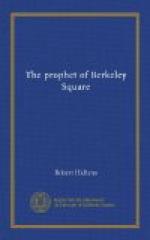“Oh, Mr. Towle—charmed, delighted!” cried Mrs. Bridgeman. “I was so afraid—How sweet of you to come out all this way from your eyrie at the Wick! You’ll find many friends—dear Madame Charlotte—the Professor—Mrs. Eliza—they’re all here. And Miss Minerva, too! Your greatest admirer and disciple!”
At this moment the crowd, wild in its endeavour to touch the inspired broadcloth of the great Towle, surged forward, and the Prophet was driven like a ram against the left side of his hostess.
“I beg—your—pard—” he gasped; “but could you tell—me—where Miss Minerv—erva—is? I special—ly want to—to—”
“I think she’s with Eureka in tea-room number 1,” replied Mrs. Bridgeman. “Oh, dear! Near the band. Oh, dear! Oh, my gown! Oh! So sweet of you to come, Mrs. Lorrimer! Just a few interesting people! Oh, gracious mercy! Oh, for goodness’ sake!”
She was thrust against a new arrival, and the Prophet, bringing his shoulders vigorously into play, according to the rules of Rugby football, presently found himself out in the open and free to wander in search of Miss Minerva, whom he was most anxious to encounter before the arrival of Sir Tiglath Butt, which must now be imminent, despite the marked disinclination of his horse to proceed at the rate of more than half a mile an hour.
The Prophet abandoned Mr. and Madame Sagittarius to their fate, thankful, indeed, to be rid for a moment of their prophetic importunity.
Following the gasped directions of Mrs. Bridgeman, he made towards the guitars, threading a number of drawing-rooms, and passing by the doors of various mysterious chambers which were carefully curtained off in a most secret manner. Here and there he saw groups of people—men in extraordinary coats and with touzled masses of hair, women in gowns made of the cheapest materials and cut in the most impossible fashions. Some wore convolvulus on their heads, ivy-leaves, trailing fuchsia, or sprigs of plants known only to suburban haberdashers; others appeared boldly in caps of the pork-pie order, adorned with cherry-coloured streamers, clumps of feathers that had never seen a bird, bunches of shining fruits, or coins that looked as if they had just emerged from the seclusion of the poor-box. Thread gloves abounded, and were mostly in what saleswomen call “the loud shades”—bright scarlet, marigold yellow, grass green or acute magenta. Mittens, too, were visible covered with cabalistic inscriptions in glittering beadwork. Not a few gentlewomen, like Madame, trod in elastic-sided boots, and one small but intrepid lady carried herself boldly in a cotton skirt topped with a tartan blouse “carried out” in vermilion and sulphur colour, over which was carelessly adjusted a macintosh cape partially trimmed with distressed-looking swansdown. Here and there might be seen some smart London woman, perfectly dressed and glancing with amused amazement at the new fashions about her; here and there a well set-up man, with normal hair and a tie that would not have terrified Piccadilly. But for the most part Mrs. Bridgeman’s guests were not quite usual in appearance, and, indeed, were such as the Prophet had never gazed upon before.




